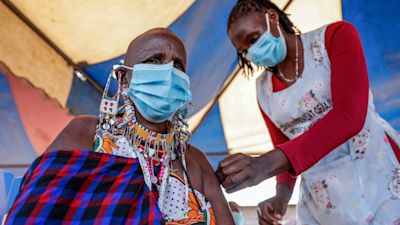IMF urges rich nations to deliver on vaccine pledges to developing nations

The coronavirus pandemic still grips the world, causing economic havoc and magnifying inequality between richer and poorer nations.
The International Monetary Fund’s (IMF) latest World Economic Outlook reads like a global call to arms.
Inflation stalks the land, threatening hardship in advanced economies and starvation in those where resource is tight.
The IMF speaks of a “dangerous divergence in economic prospects” between the ‘haves’ and the ‘have nots’ and urges nations to pull together.
A global recovery is underway but the spread of the highly transmissible Delta variant of coronavirus continues to hold activity back.
The IMF points out that while the UK and other advanced economies have managed to fully-vaccinate 60% of their populations and roll out booster jobs, the vaccination rate among low-income countries is only 4%.
How does the UK's economy compare to others, asks Economics Editor Joel Hills
Governments in wealthy countries have been able to borrow to support households and businesses during lockdown in a way that those in poorer countries have not.
“The outlook for low-income, developing [countries] has darkened considerably,” says Gita Gopinath, the IMF’s economic counsellor and director of the Research Department.
Food prices have risen, in places food has become scarce “raising the risk of social unrest.”
'Risks to economic prospects have increased', says the IMF’s economic counsellor:
The IMF calls on the UK, along with the other G7 and G20 countries, to “fulfil existing donation pledges” and ensure vaccine production happens where the need is greatest.
It sets the target of vaccinating at least 40% of the population of every country in the world by the end of 2021 and 70% by mid-2022.
This is not only the humane thing to do, the IMF argues, it is also in our economic interests - failure to hit these targets runs the risk of another mutation of the virus emerging.
'The pandemic is not over anywhere until it is over everywhere...'
“Speeding up the vaccination of the world population remains the top policy priority, while continuing the push for widespread testing and investing in therapeutics,” the IMF says.
“This would save millions of lives, help prevent the emergence of new variants, and hasten the global economic recovery.”
It’s slow going for many advanced economies. The UK’s growth prospects this year have been downgraded, along with those of Germany, Spain, Japan, Canada and the US.
'Divergences [between countries] are a consequence of the great vaccine divide...'
Restrictions have lifted but growth is being hampered by disruption to supply chains and higher commodity prices - notably gas and oil - which are causing inflation.
The IMF seems to believe that the bottlenecks which are causing prices to rise will prove temporary but what happens next will depend on how long supply disruption lasts, what happens to inflation expectations and the path of the virus.
The danger is that output will disappoint and that price rises will prove persistent.
For now the clear advice to central banks is to keep interest rates low but the IMF says they should be “prepared to act quickly” if circumstances change.
It’s a sign of how uncertain times are that global warming, a grave threat to our future prosperity, gets only a passing mention in the IMF’s Executive Summary.
“The current pledges on climate change are not enough to prevent the over-heating of the planet,” it reminds.
For now, the most pressing danger is coronavirus and the world must be vaccinated.
Our fortunes are intertwined. By helping others, the IMF argues, we help ourselves.